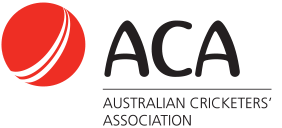Increasing female leadership in Australian cricket
31 March, 2022
Women’s cricket in Australia has grown at an exponential rate over the past decade, with a popular and successful national team and the hugely successful WBBL paving the way for increased visibility and professionalism for female athletes.
While women have been taking great strides on the field, the ACA is committed to taking steps to increase female leadership and gender diversity in other areas of the game in the longer term, including coaching and administration roles.
As part of this drive, the ACA and Cricket Australia enlisted former Australia captain and ICC Hall of Famer Belinda Clark to pilot the first Female Leadership Program in Australian cricket, which is now in its final stages and involves players including Chloe Piparo, Matilda Lugg, Tahlia McGrath, Heather Graham, Ashleigh Gardner, Jess Jonassen, Nicole Faltum and Sophie Molineux.
Clark, who now runs The Leadership Playground, has held numerous influential roles within the game since her retirement, including managing the National Cricket Centre in Brisbane and as Cricket Australia’s General Executive Manager of Community Cricket.
Her experience as one of the most high profile and experienced female leaders in cricket has given her an acute awareness of the need to equip players with the tools that will help them lead both on and off the field.
“I think what we're seeing with an increase in opportunities for females on the field, a lot of younger players are coming through into the elite sporting system earlier than perhaps they would have previously,” said Clark. “I think that those younger players at some point are going to be asked to lead teams or play leadership roles earlier than perhaps what they may have in the past just because of their high level of skill and involvement in team plans for the future.
“And those young players, as well as the current leaders, are working in environments, generally speaking, that are likely skewed male in terms of current high performance leaders and I want to help the emerging player leaders be well equipped to learn, be courageous and make a positive difference to their teams.
“So that means that they need to be supported. They need to have some opportunities to express what they're experiencing, they need some plans and opportunities to try things. And at the end of this, what I'm hoping is that having had an experience leading, or being involved in leadership of a sporting team, sets you up really nicely to then have a positive impact beyond the sporting field.”
Players from were identified and nominated as emerging leaders in a collaboration between the ACA, CA and the State Associations to take part in the program with the particular support and assistance of Shawn Flegler, Cricket Australia’s Female High Performance Manager and Chair of the Women's National Selection Panel.
Western Australia’s Chloe Piparo was one player who jumped at the opportunity to learn from Clark’s experience.

“It was a great experience,” said Piparo. “To be able to tap into Belinda's knowledge, and experience, as a leader was really cool.
“I think for me, just being a captain and leading, you do a lot of reading and research and stuff like that, but it's really hard to get any help so it was really cool to be able to have that experience so I could go back to Belinda and be like, this is how that kind of situation panned out and this is what I learned.
“That's the biggest thing for me and how I want to lead and kind of try to build relationships with my players, so we did a lot of that stuff.”
Clark led online group discussions and also spent time with players individually, identifying their specific needs and tailoring the program to help them develop their potential. The participants were given reading material and podcasts and encouraged to put their leadership skills to practical use, whether in a game situation or in other areas of life.
At 22 years of age, Matilda Lugg was one of the younger participants in the program. After playing for the Sydney Sixers in the WBBL, she suffered an injury at the start of this year’s WNCL competition, in which she plays for the ACT Meteors, but felt the sessions with Clark changed her perception of what it means to be a leader.
“It's just sort of given me lots of ideas around how to lead, especially in situations where I'm not a formal leader and as a younger person in teams,” said Lugg. “Ways to lead by values and behaviours when you don't necessarily have a formal leadership position. So that's been really helpful and, as well through that injury, I think this program gave me something to work towards being a leader on the sidelines as well as on the field.
“It's taught me so much about myself as well, just working with her, especially about tactics of the game. She's just so good to talk to about that. Every session I learned a lot from her and also learned with the group sessions about how other people interpreted things and hearing from their perspectives because, obviously, the other girls are pretty incredible in their own right so just learning from them as well was really valuable.”
Clark worked with the players on a range of areas including on-field tactics, delegation, culture, communication and conflict management; she believes those skills will provide players with the tools to deal with situations within the game and also in their careers that follow.
I couldn't speak highly enough of the program. I got so much out of it. I feel like I really grew as a leader and as a person as well.
Chloe Piparo
“It was a great experience,” said Piparo. “To be able to tap into Belinda's knowledge, and experience, as a leader was really cool.
“I think for me, just being a captain and leading, you do a lot of reading and research and stuff like that, but it's really hard to get any help so it was really cool to be able to have that experience so I could go back to Belinda and be like, this is how that kind of situation panned out and this is what I learned.
“That's the biggest thing for me and how I want to lead and kind of try to build relationships with my players, so we did a lot of that stuff.”
Clark led online group discussions and also spent time with players individually, identifying their specific needs and tailoring the program to help them develop their potential. The participants were given reading material and podcasts and encouraged to put their leadership skills to practical use, whether in a game situation or in other areas of life.
At 22 years of age, Matilda Lugg was one of the younger participants in the program. After playing for the Sydney Sixers in the WBBL, she suffered an injury at the start of this year’s WNCL competition, in which she plays for the ACT Meteors, but felt the sessions with Clark changed her perception of what it means to be a leader.
“It's just sort of given me lots of ideas around how to lead, especially in situations where I'm not a formal leader and as a younger person in teams,” said Lugg. “Ways to lead by values and behaviours when you don't necessarily have a formal leadership position. So that's been really helpful and, as well through that injury, I think this program gave me something to work towards being a leader on the sidelines as well as on the field.
“It's taught me so much about myself as well, just working with her, especially about tactics of the game. She's just so good to talk to about that. Every session I learned a lot from her and also learned with the group sessions about how other people interpreted things and hearing from their perspectives because, obviously, the other girls are pretty incredible in their own right so just learning from them as well was really valuable.”
Clark worked with the players on a range of areas including on-field tactics, delegation, culture, communication and conflict management; she believes those skills will provide players with the tools to deal with situations within the game and also in their careers that follow.
“They're skills you need all the way through life,” Clark said. “But if you don't take the opportunity when you're leading a sporting team to develop them, then you're starting from scratch when you're in the workforce and I think that's a missed opportunity.”
The ACA hopes the program will help address the current lack of diversity across some areas of the game in the long term, by preparing potential future leaders and arming them with the necessary experience to take on leadership roles. The ultimate goal is to develop a deep pool of talented women who can contribute to the game well beyond their playing days.
“Considering the environment in which you operate is critical. Developing more female leaders within the game is a job for both males and females and I have been heartened by the support provided to the players from within the Female High Performance programs across Australia. This is about how we work together to create a better future, a future that includes more female coaches, umpires, administrators, directors. Sport and in this case cricket needs to keep working on this area and importantly the players have an opportunity to take on the challenge of developing leadership capability and confidence that will serve them well through and beyond their cricket playing days.”
Lugg agrees there is space for more female leaders within the game and the program has given her greater confidence and food for thought about her own future aspirations.
“I didn't have as many ambitions as I do now with leadership in cricket,” said Lugg. “I think after doing this program with Belinda, I have plenty more ambitions there. And I want to sort of keep learning and keep working on leadership, not just as a position but also just in behaviours.
The ACA will be running two more iterations of the Female Leadership Program in 2022 and Piparo is encouraging fellow players to take advantage of Clark’s expertise.
“I couldn't speak highly enough of the program,” said Piparo.
“I got so much out of it. I feel like I really grew as a leader and as a person as well. I'd love to be able to tap into Belinda for the rest of my career, so I'd encourage anyone and everyone to kind of take part in it if they get the opportunity.”
Latest News
Corinne Hall hails WNCL growth ahead of historic final
Alex Blackwell's Fair Game documents breaking the bias

